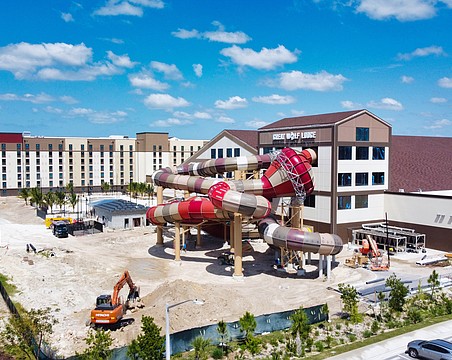Gallagher Grandstands Again
Florida Chief Financial Officer Tom Gallagher officially began his campaign for governor last week. He held a press conference to urge the state's insurance commissioner to freeze Florida's property insurance rates immediately.
These guys are so predictable.
As soon as news spread of Gallagher's bold, grandstanding efforts to stand up for Florida's consumers, he took us back a dozen years. Gallagher was Florida's insurance commissioner when Hurricane Andrew devastated Homestead. And if memory serves us, he froze insurance rates then to do what he says needs to be done now - "stabilize" the homeowner's insurance market in the wake of Hurricanes Charley, Francis, Ivan and Jeanne. Back then, according to Gallagher's online biography of himself, he was a hero in 1993: "He marshaled public and private, state and federal resources to expedite claims handling and protect consumers against price gouging."
And so here we are again - protecting consumers against price gouging. Or, at least that's what he wants you to think. At his briefing last Thursday, Gallagher said: "'I'm extremely concerned that there is a trend with companies, including Nationwide, trying to recoup their losses from the hurricanes or raising their rates so policyholders are forced to drop coverage. Homeowners who have suffered losses from the four back-to-back storms should not be victimized a second time."
The reference to Nationwide was a reference to the Ohio insurer's request for a 28% rate increase and a doubling of rates on mobile homes. It's one of 31 insurance carriers, out of 250 operating in the state, that have filed for rate increases since the hurricanes. (We should be amazed that number is so few.) According to the Florida Insurance Council, most of the approved rate increases have been for 10% or less, "with only two or three approved in the 20% to 25% range."
Despite that, it looks good politically to stand up to the insurance companies, and Gallagher, ever the career Tallahassee politician, knows it.
In truth, Gallagher's call for a rate freeze only will make a bad situation worse. The trouble began not with the 2004 hurricane season but in the aftermath of Hurricane Andrew in 1992. Then, Gallagher led efforts in the statehouse to "stabilize" Florida's insurance market with layers of new regulations that, today:
• Guarantee a shortage of insurance;
• Artificially depress insurance rates in an unsustainable manner;
• And prevent consumers from having any choice but to be thrown in the state-controlled insurer of last resort, Citizens Property Insurance Corp., whose own stability is questioned by the Insurance Information Institute, an industry research watchdog.
Thanks to Tallahassee, Florida has a perverse insurance situation. Here's why:
After Andrew, Gallagher and state lawmakers enacted laws that forbid solvent insurers, such as Allstate, State Farm and others, from pulling out of the state altogether and from raising rates as high as the market would bear. At the time 11 insurance companies folded, unable to pay on their policyholders' claims. Floridians saw the non-cancellation legislation and caps on rates as good policies.
At the same time, lawmakers created a Catastrophe Reinsurance Fund. This requires every property insurer in Florida to contribute a portion of every policy into this special savings fund.
It was designed to create an extra pool of cash that could be tapped in the event an insurer in the future is unable to cover its policies in the wake of a catastrophe. Insurers can't tap this fund, however, until altogether they pay out $4.5 billion in claims after one event.
Still, according to the Insurance Information Institute, insurers used about $3 billion of the catastrophe fund's $6 billion in cash to meet claims.
But an onerous aspect to this catastrophe fund is this: Insurers are assessed - or required to pay into it - on the basis of market share. State Farm, for example, has nearly 20% market share, so its policyholders are on the hook for 20% of the catastrophe fund's losses no matter what. So as the state grows, and as the number of policyholders grows in the state-controlled Citizens Property Insurance Co. (it's Florida's second-largest insurer), the potential monetary risk against catastrophic losses increases for every insurer. It doesn't matter if an insurer has only enough capital and reserves to cover its own policyholders. Every insurer faces the prospect of assessing its policyholders to cover the losses of other companies.
The effect is this: Insurers have no incentive to risk their shareholders' capital in Florida. There's no reward. As one insurer told us: "If you're a shareholder of an insurance company, you're already nervous about storms. Now Gallagher comes along and limits what you could charge. Why would you ever want to sell insurance here?"
Dr. Robert Hartwig, senior vice president and chief economist at the Insurance Information Institute in New York, is equally sobering about the state of Florida's property insurance market. In testimony last month in Tallahassee before a Joint Select Committee on Hurricane Insurance, Hartwig said the situation is unsustainable (see excerpts).
Hartwig, without being overly explicit, urged the state to lift its destructive pricing controls. "Florida's homeowners insurance markets have historically provided investors with negative rates of return and thus little incentive to bring additional capital to the market to support future economic growth in the state," he said. "It is imperative that capital be given the opportunity to earn a market-based rate of return..."
Gallagher needs to quit grandstanding and face reality. But that will never happen. He wants to be governor.





